While Victoria’s Covid period was ‘tricky’ police chief Shane Patton says he has the best job in world
Victoria Police chief Shane Patton admits being “bruised” by the work his force had to do during Covid lockdowns and its image took a hit.
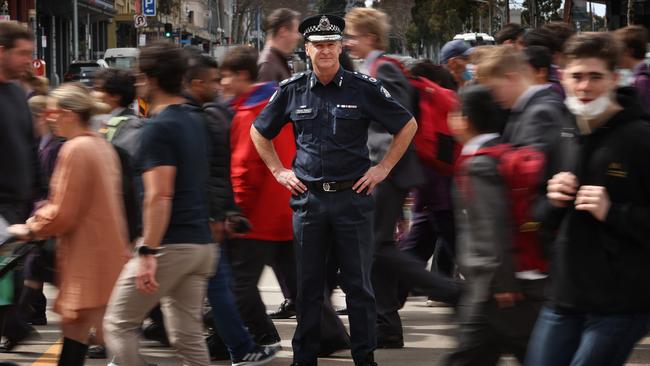
VWeekend
Don't miss out on the headlines from VWeekend. Followed categories will be added to My News.
The timing was terrible. Victoria Police Chief Commissioner Shane Patton was thrust into the force’s highest job in June 2020.
Pandemic anxiety and panic were peaking and Patton was doomed to be a face for a strange – and unwelcome – approach to work, life and freedom.
He isn’t naturally inclined to speak about himself or his life. And he seemed comfortable with his stern persona. It covered off the essential boxes in a crisis.
As a policeman, Patton boasted a street cred that some of his top job predecessors had not. He’d worked in a divvy van. Nabbed illegal bookies while sporting long hair in pubs.
He had learned to be a detective in the heroin-bathed excesses of St Kilda in the 1980s, when old school cops reached for their gun, baton and handcuffs.
Patton was a local street cop who had evolved. He had been a police prosecutor and bushfire and disaster response overseer. He headed anti-terrorism operations which stymied three plots.
For Victoria’s 23,000 or so police officers, he was a “real cop”.
For everyone else, however, Patton’s appointment was marked by an absence of detail. Who was he? What was he like?
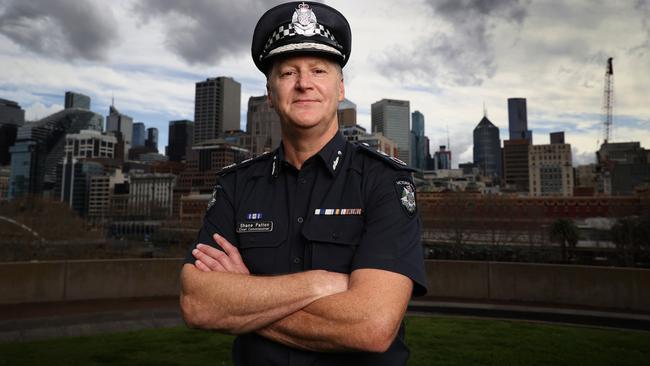
Patton was to be a public figure who would help dictate what we could and could not do. Yet those who read the official guff at the time learned that Patton was married with two kids, and not much else.
Mr Boring, as he was presented, would stand alongside Mr Andrews and Mr Sutton as a corner piece in grim enforcement.
Patton can now admit to moments when he could have expressed himself better.
Asked about unpopular bans, when Patton announced that police would patrol playgrounds, he cites “10 or 20” press conferences that could have been better.
3AW’s Neil Mitchell, who regularly has Patton on his radio show, says Patton is the most forthright of any recent chief commissioner.
And away from the microphone, you discover, the contrast between the public official and the private bloke is rather surprising. Patton is not, as he likes to claim, at all boring.
His plain way of speaking is an obvious strength – and a potential weakness. He’s a cop, not a politician.
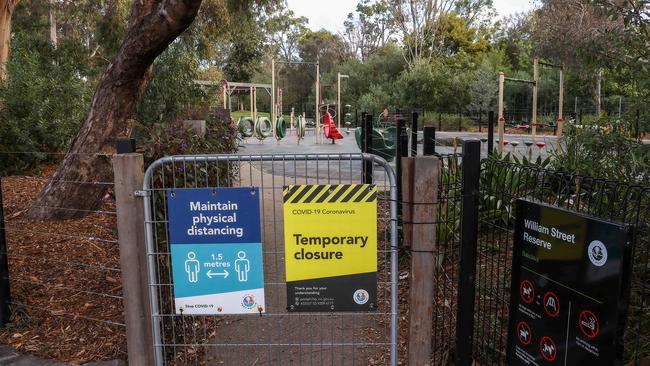
No doubt Patton has been trained in what to say and what not to. But he is one of those rare people in public life who answers the question put to him.
Patton calls the pandemic a “tricky time”. He was performing a duty that neither he – nor his police force – had trained for, nor wanted to do.
He talks about being “bruised”, arguing that we all were, describing the pandemic as “anything but natural”. The image of Victoria Police took a hit, he admits.
Patton tried to learn fast. He had filled in as chief, from time to time. But it’s different when you’re setting your own tone and direction – in crazy times.
He recalls, laughing, how he announced that police measures to restrict movement were not a “ring of steel”, only to find that the measures would instantly be known as the “ring of steel”.
For him, the police pandemic response sometimes felt like a “no win”. His officers were too zealous or too soft, according to who you asked.
He understands that some people perceived that the fiercely guarded independence of the force was challenged, but he also disputes the claim.
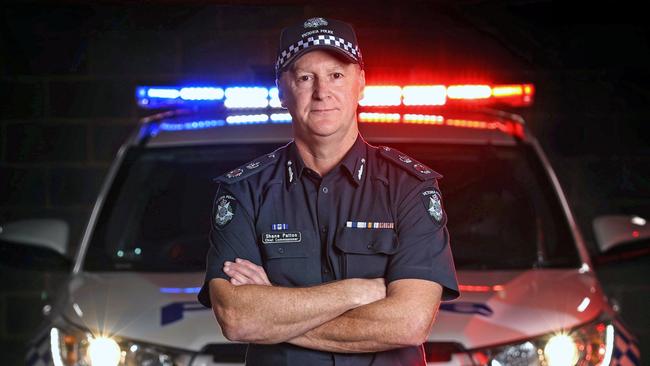
He denies disagreements with chief health officer Brett Sutton and/or Premier Daniel Andrews in those times when the Covid response message fragmented. Yet in September 2020 he did refute a claim by Andrews that the police had been consulted about curfews.
“I was asked a direct question, and I gave a direct answer,” he says. “It’s as simple as that.” In the early days, every Covid infringement notice came through Patton’s office for review. He personally assessed many.
The measure? If a family member had received an infringement, in the circumstances of an issued fine, would it seem justified when they got home to explain why?
Patton declares that: a) Victoria Police largely got it right; and b) some eyebrows will be raised by this declaration.
He won’t concede the higher-profile cases, such as Zoe Buhler, the pregnant mother arrested at home for incitement, in charges later dropped.
But he does speak of an unusually protracted crisis, of toilet paper fights and fines for people who went for a surf.
“There’s no doubt that in some circumstances some of the infringements that we gave out shouldn’t have gone ahead,” Patton says.
“(But) we are applying hindsight and it’s a wonderful thing and we have to contextualise what the circumstances were at that time.
“I mean no one wants to be seen as just the person who’s got the big stick ... I get that that was a lot of the persona that I displayed at the time ... but it was important that people understood that there were consequences.”
He poses his own question: “Is it something that I necessarily want(ed) to do?”
“I don’t think any police officer joined up to be doing those actions,” he replies.
As for the wonders of post crisis analysis? “If I had the wisdom of hindsight (at the time) I’d be a much better chief commissioner and a much richer man as well,” he says.
PATTON, off stage, is a good talker when he gets going. He defaults to poking fun at himself.
Some colleagues speak of an almost goofy warmth, as illustrated when he talks about ripping his hamstring from the bone. A table tennis moment, he slid into the splits – “like I was doing some ballet thing” – and almost fainted from the pain.
Patton, 60, is known to be loyal. Demanding, too – heaven help any subordinate who fronts up unprepared.
He doesn’t read reports, he consumes them. Force priorities are categorised as “must do” and “nice to do”. Frontline policing “is everything”.
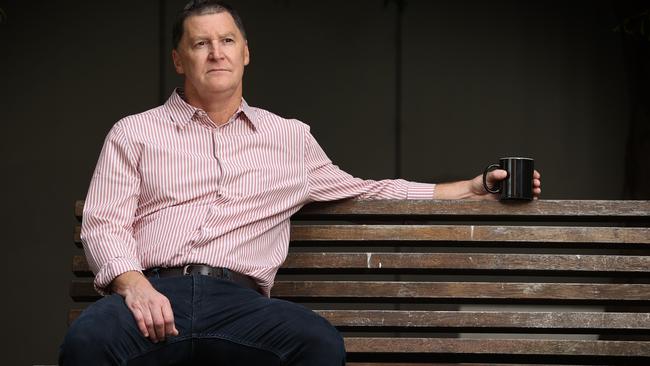
He’s also the bloke who feels obliged to be out and about. He catches the train (and attracts stares) if he expects to have a drink or two, such as going for dinner or to the footy (he barracks for Essendon).
He’s a police chief commissioner who laments any perception of wowserism, in part because he celebrates catching up with non-police friends, from chefs to property developers, with a beer or a red. Such friends, he says, would tell him when this or that seemed like overreach during the pandemic. He says he listened to them. They kept him grounded.
Indeed, Patton’s non-police life seems crucial to his policing approach. If his private appears to conflict with his public, it also informs it.
Patton grew up in Seymour. It wasn’t alwayseasy; with their then single mother Dawn, three brothers for a time shared a bedroom.
He didn’t particularly like school (the aptitude came later), apart from home economics and he applied to be an apprentice chef at a Melbourne hotel but missed out.
Older brother Mark had joined the police. Mum was pleased when son Shane did, too.
So he walked and drove the street, a uniformed constable who sometimes got a kick in the Brunswick 2nds in the VFA.
The city job was exhilarating, and occasionally scary. He faced a sliding doors moment in the mid 1980s, when he and a female officer responded to a break-in report for what turned out to be a Coburg drug house.
He went through the front, his partner through the back.
Patton tried to adjust to the darkness of the hallway. A woman emerged from a room, pulling up her pants. “He raped me, he f---ed me,” she yelled.
A large man materialised behind the woman. He held a sawn-off shotgun. Patton’s adrenaline surged as he pulled his police gun.
“Get on the ground, get on the f---ing ground,” he yelled at the man.
Time tends to slow in dramatic moments. But Patton remembers the speed of the exchange. He was about to shoot; he has often wondered since about if he had.
Then the man dropped the gun.
“Thank Christ,” he thought, as he put his foot on the offender, and his heart rate slowed, and the trembling eased.
“If you spend a long enough period in this job …” he begins, “sometimes you get lucky and other times a member has to pull that trigger and for the next two or three years their split second decisions are being forensically examined.”
He joined St Kilda as a detective in the late ’80s. He worked hard and played hard. He might start the day at 4.30am, perhaps with a ciggie, then break down a door on an early morning raid, before finishing the shift with beers.
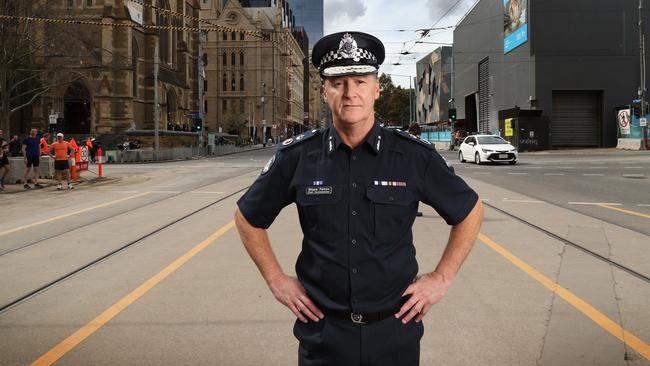
They were celebrated times, some say unhinged, which preceded police policies of harm reduction and notions of post-traumatic stress.
The era was tinged by cowboys and corruption. Yet no notoriety stuck to Patton; if it had, we would have heard about it before now.
He looked like a Mormon, a former colleague says, earnest in ways that could be mistaken for naivete. He had the involuntary facial twitch then, as now. He was not overly concerned with criticism then, as now.
This was fortunate. As Patton tells the story, he applied to the homicide squad while he worked at St Kilda and thought he was a hot chance.
After a panel examination, he was told he hadn’t made it. He pushed for answers. Sorry, mate, he was told, you didn’t get close. You were “terrible, really terrible”.
“The lesson from that for me was that you might think that you’re quite reasonable but others sometimes have a different view,” he says.
“It’s how you deal with the disappointments in life that’s a test of anyone’s character.”
Patton enjoys telling stories against himself.
As a police prosecutor, imbued with a 12-week course, he would feel empowered in the courtroom one day, then try “to find a hole to crawl in to the next”.
In his early 20s, Patton met Maree, a country girl. Patton had been told that she thought he was good-looking – after subsequent catch-ups, she admitted that she had been referring to another man. Parents to a son and daughter, they have been married 37 years.
In 1989, the couple travelled for 11 months in a time out.
They camped on the Berlin Wall. In Moscow’s Red Square, in a prized photo, Patton sported a red beard. The day after their return, after a shave, Patton gave evidence to the coronial court about a police shooting.
“I think wow how did I end up in this position and how did I manage to get given this opportunity?” he asks about his role.
He knows at least part of the answer. Of Maree, he says: “We always say we are the sum of the total of the both of us. I wouldn’t be here if not for her.”
A former St Kilda detective colleague visitedPatton in his 37th floor office a few months after he started as chief commissioner.
Family photos filled the room, far too many for show. A birthday present montage of the many places he and Maree have visited – such as Cuba, Israel and Bolivia – would come later.
Outside, it was Covid chaos; after dispensing hard truths by day, Patton would go home to a full (and happy) house trapped like everyone else by restrictions.
“You’ve got the worst f---ing job in the world,” the former colleague told Patton.
“No, Patton replied. “I’ve got the best job.”





